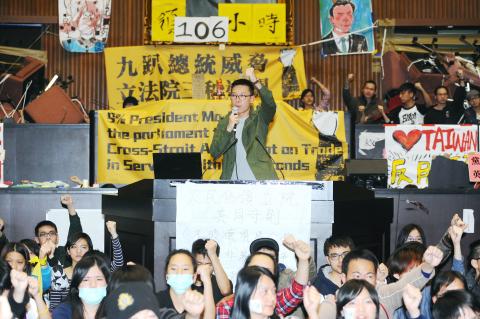Student activists occupying the legislative chamber yesterday announced that they would expand their protest, as President Ma Ying-jeou (馬英九) and Legislative Speaker Wang Jin-pyng (王金平) had failed to answer their demands about the contentious cross-strait service trade agreement.
“As both Ma and Wang did not respond positively [to our demands], we have decided to expand our action by calling on the public to surround the Chinese Nationalist Party’s [KMT] local headquarters wherever they are,” Lin Fei-fan (林飛帆), a graduate student of political science at National Taiwan University and one of the leaders of the protest, said at press conference in the legislative chamber.
“Meanwhile, the occupation and siege of the Legislative Yuan will not end. We will continue on and call on more people to join us until we receive positive responses from Ma and Wang,” he said.

Photo: Chang Chia-ming, Taipei Times
Lin said the KMT caucus’ questionable passing of the trade pact at a joint committee meeting and forwarding it to the plenary session have created a constitutional crisis, “and now the government under Ma’s leadership has lost its legitimacy to govern, as it has not only refused to respond to questions from the public, but also threatened us with riot police and water cannons.”
Lin was referring to the increase in police reinforcement as well as the arrival of water cannons near the legislature last night. Police also surrounded the Executive Yuan with barbed wire and blocked several roads leading to the Presidential Office Building.
“We will continue to occupy the legislature. We will not retreat,” Lin shouted.
Despite the presence of 200 to 300 students in the legislative chamber and thousands of demonstrators outside the legislature, the protest was peaceful throughout the day.
Students activists in the chamber formed small groups to discuss issues about the trade agreement, saying they wanted to show legislators what democracy is.
“This is the time when a general assembly is supposed to take place, but we will be holding our own deliberative democracy meeting on the service trade pact here in place of a regular legislative meeting,” Chiang Ping-lun (江昺崙), a spokesperson for the protest told the crowd before the forum started. “We will show the lawmakers how to discuss such an important issue in a peaceful, rational and democratic way.”
They later wrote their conclusions on small pieces of paper, and posted the papers on the wall on the two sides of the podium to spell out the two English words “freedom” and “democracy” in capital letters.
Chiu Hsien-chih (邱顯智), a lawyer, later showed up to announced that more than 300 lawyers have joined a team of lawyers to provide legal assistance to the protesters.
“We would like to tell the parents of all the student activists that there are doctors and lawyers [supporting the protest] and we will make sure that your children will be able to go home safely,” he said.
He reminded the students that if they arrested, they should use their right to silence and demand to see a lawyer.
Meanwhile, Taipei District Prosecutor Office prosecutor Liu Cheng-wu (劉承武) filed a lawsuit against Ma and National Police Administration Director-General Wang Cho-chiun (王卓鈞), accusing them of manslaughter, harm and aggravated harm against others.
Liu said he had learned that police had been given orders to clear out the students occupying the legislative chamber.
The order would cause bloody conflict between students and police, Liu said, adding that if Ma and Wang Cho-chiun ordered a forceful clearing of the chambers, they would be overreaching their authority and contravening the Constitution.
Additional reporting by Hou Po-ching

FORCED LABOR: A US court listed three Taiwanese and nine firms based in Taiwan in its indictment, with eight of the companies registered at the same address Nine companies registered in Taiwan, as well as three Taiwanese, on Tuesday were named by the US Department of the Treasury’s Office of Foreign Assets Control (OFAC) as Specially Designated Nationals (SDNs) as a result of a US federal court indictment. The indictment unsealed at the federal court in Brooklyn, New York, said that Chen Zhi (陳志), a dual Cambodian-British national, is being indicted for fraud conspiracy, money laundering and overseeing Prince Holding Group’s forced-labor scam camps in Cambodia. At its peak, the company allegedly made US$30 million per day, court documents showed. The US government has seized Chen’s noncustodial wallet, which contains

SUPPLY CHAIN: Taiwan’s advantages in the drone industry include rapid production capacity that is independent of Chinese-made parts, the economic ministry said The Executive Yuan yesterday approved plans to invest NT$44.2 billion (US$1.44 billion) into domestic production of uncrewed aerial vehicles over the next six years, bringing Taiwan’s output value to more than NT$40 billion by 2030 and making the nation Asia’s democratic hub for the drone supply chain. The proposed budget has NT$33.8 billion in new allocations and NT$10.43 billion in existing funds, the Ministry of Economic Affairs said. Under the new development program, the public sector would purchase nearly 100,000 drones, of which 50,898 would be for civil and government use, while 48,750 would be for national defense, it said. The Ministry of

SENATE RECOMMENDATION: The National Defense Authorization Act encourages the US secretary of defense to invite Taiwan’s navy to participate in the exercises in Hawaii The US Senate on Thursday last week passed the National Defense Authorization Act (NDAA) for Fiscal Year 2026, which strongly encourages the US secretary of defense to invite Taiwan’s naval forces to participate in the Rim of the Pacific (RIMPAC) exercise, as well as allocating military aid of US$1 billion for Taiwan. The bill, which authorizes appropriations for the military activities of the US Department of Defense, military construction and other purposes, passed with 77 votes in support and 20 against. While the NDAA authorizes about US$925 billion of defense spending, the Central News Agency yesterday reported that an aide of US

UNITED: The other candidates congratulated Cheng on her win, saying they hoped the new chair could bring the party to victory in the elections next year and in 2028 Former Chinese Nationalist Party (KMT) lawmaker Cheng Li-wun (鄭麗文) yesterday won the party’s chair election with 65,122 votes, or 50.15 percent of the votes. It was the first time Cheng, 55, ran for the top KMT post, and she is the second woman to hold the post of chair, following Hung Hsiu-chu (洪秀柱), who served from 2016 to 2017. Cheng is to succeed incumbent Eric Chu (朱立倫) on Nov. 1 for a four-year term. Cheng said she has spoken with the other five candidates and pledged to maintain party unity, adding that the party would aim to win the elections next year and